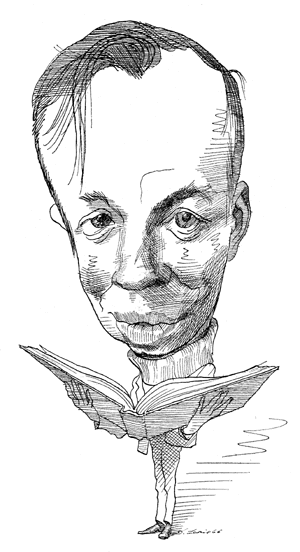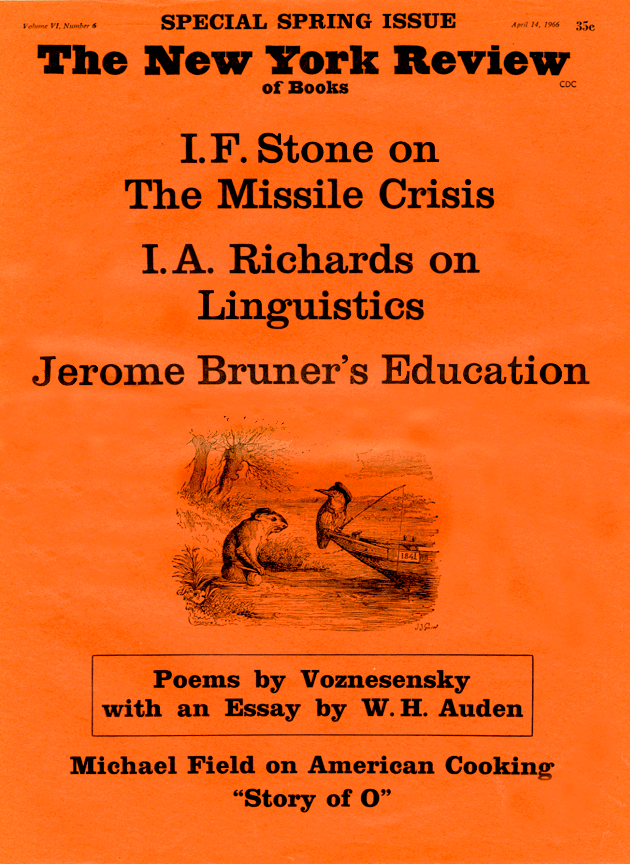It is, of course, sheer folly to imagine that one can pass judgments which are either accurate or just upon poems written in a language which one does not know.
Irrespective of their relative merits, some poets lose less in translation than others. Even in the crudest prose translation a non-Italian reader can immediately recognize that Dante is a great poet, because much of the impact of his poetry depends upon his use of similes and metaphors drawn from sensory experiences which are not confined to Italians but common to all peoples, and upon his gift for aphoristic statements expressed in the simplest everyday words for which every language has a more or less exact equivalent: e.g., “That day we read in it no further.”
Translation also favors poets like Hölderlin and Smart, who were dotty; for their dislocation of normal processes of thinking are the result of their dottiness, not their language, and sound equally surprising in any: e.g., “…now the heroes are dead, the islands of Love are almost disfigured. Thus everywhere must Love be tricked and exploited, silly.”
A poet like Campion, on the other hand, whose principal concern is with the sound of words and their metrical and rhythmical relations, cannot be translated at all. Take away the English language in which his songs were written, and all that remains are a few banal sentiments.
The most notorious case of an untranslatable poet is Pushkin. Russians are unanimous in regarding him as their greatest poet, but I have yet to read a translation which, if I did not know this, would lead me to suppose that his poems had any merit whatsoever.
Complete ignorance, however, is perhaps less likely to lead one’s critical judgment astray than a smattering of a language. Ignorance at least knows it does not know. When one recalls the fantastic overestimation of Ossian by the German Romantics or of Poe by Baudelaire and Mallarmé, one thinks twice before expressing enthusiasm for a foreign poet.
IN THE CASE OF Mr. Voznesensky, at least I know that he is greatly admired by many of his fellow countrymen, and, after reading literal prose translations of his poems, studying metrical models, and listening to tape-recordings of him reading his own work, I am convinced that his admirers are right.
As a fellow maker, I am struck first and foremost by his craftsmanship. Here, at least, is a poet who knows that, whatever else it may be, a poem is a verbal artifact which must be as skillfully and solidly constructed as a table or a motor-bicycle. Whatever effects can be secured in Russian by rhythm, rhyme, assonance, and contrasts of diction, he clearly knows all about. For example:
Vcherá moi dóktor proiznyós: (a)
“Talánt v vas, mózhet, i vozmózhen, (b)
no vásh payál’nik obmorózhen, (b)
nye suítyes’ iz-domu v moróz”. (a)
O nós… (a)(Yesterday my doctor declared:/ “Talent in you, perhaps there may be/ but your blow torch is frozen,/ don’t go out of the house in the cold”./ Oh nose…)
Toí priródye, molchál’no chúdnoi,
(assonance)
róshcha, ózero li, brevnó— (b)
im pozvóleno slúshat, chúvstvovat’, (assonance)
tól’ko gólosa im nye danó. (b)(Nature, silent and wonderful/ forest and lakes/ is only permitted to listen and fell./ It has not been granted a voice)
Effects like the introduction of a slang word for nose in the middle of more conventional diction can be reproduced more or less in another language, but Mr. Voznesensky’s metrical effects must make any translator despair. Russian verse seems to be predominantly trochaic or dactylic, whereas English falls naturally into iambic or anapaestic patterns.
OBVIOUS, TOO, at a glance is the wide range of subject matter by which Mr. Voznesensky is imaginatively excited—he is equally interested in animals and airports, native and alien landscapes—and the variety of tones, elegiac, comic, grotesque, quiet, rebellious, etc., which he can command.
Lastly, every word he writes, even when he is criticizing, reveals a profound love for his native land and its traditions. I wish to stress this strongly because, given the existing political climate, there is a danger that we shall misunderstand him by looking for ideological clues instead of reading his poems as one would read any poet who is a fellow-countryman.
The meaning of any poem is the result of a dialogue between the words on the page and the particular person who happens to be reading it, that is to say, to no two readers is its meaning identical. Our social and historical memories as Americans or Englishmen are quite different from those of a Russian. To mention only one difference, poets in our countries have never been considered socially important enough for the State to take any notice of them, to encourage or discourage, finance or censor; whereas in Russia, whatever the regime, they have been taken seriously. But it is only in terms of our own experience that we can profitably read Mr. Voznesensky. If we should attempt to read him as if we were members of his Russian audience, our interpretation will almost certainly be wide of the mark. Besides being foolish, such an attempt is quite unnecessary. One of the primary proofs that a poem, or any work of art, has value is that, wherever, whenever, and by whomever it was made, we find it relevant to ourselves, our time, and our place. I am certain that Mr. Voznesensky is a good poet because, though I know no Russian and have never been to Russia, his poems, even in English translation, have much to say to me.
Advertisement
This Issue
April 14, 1966



